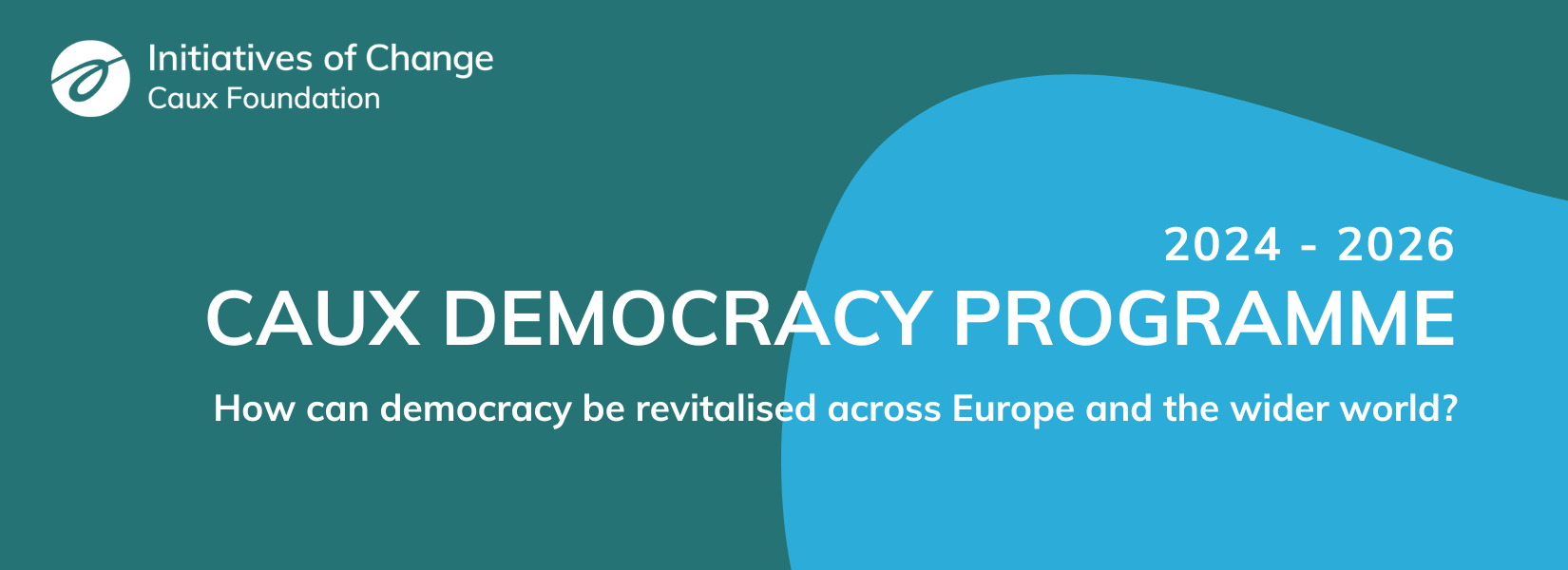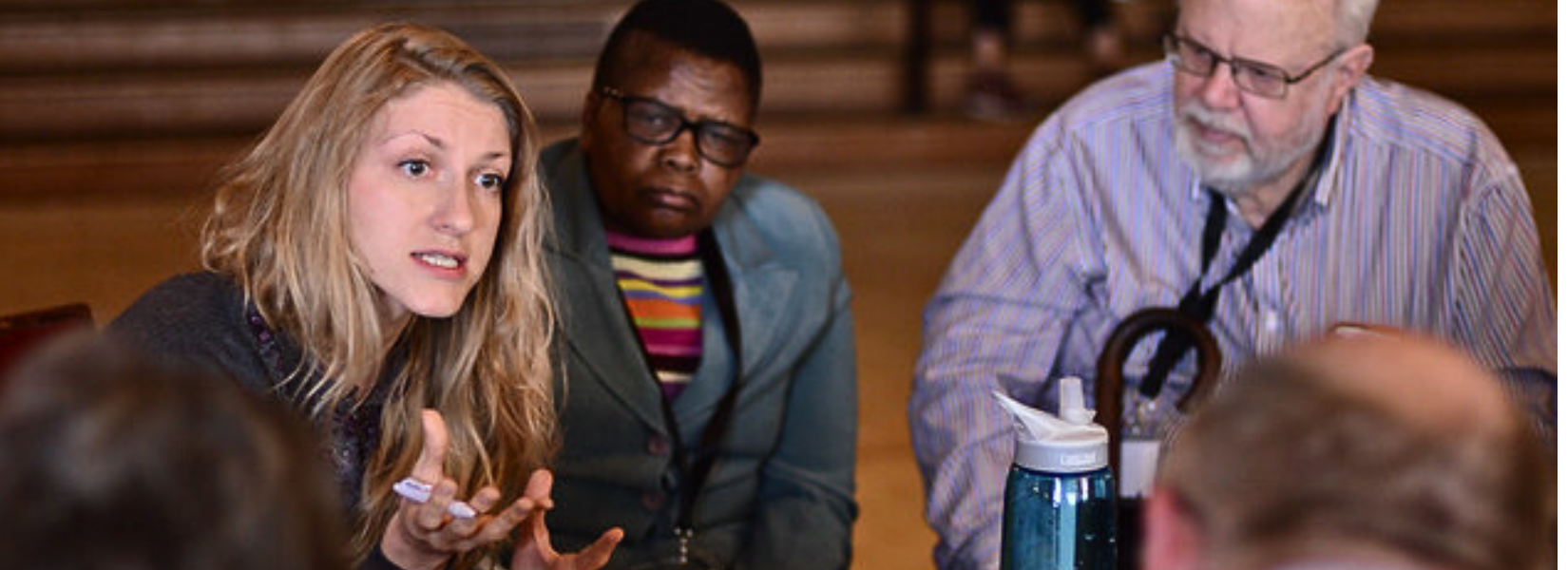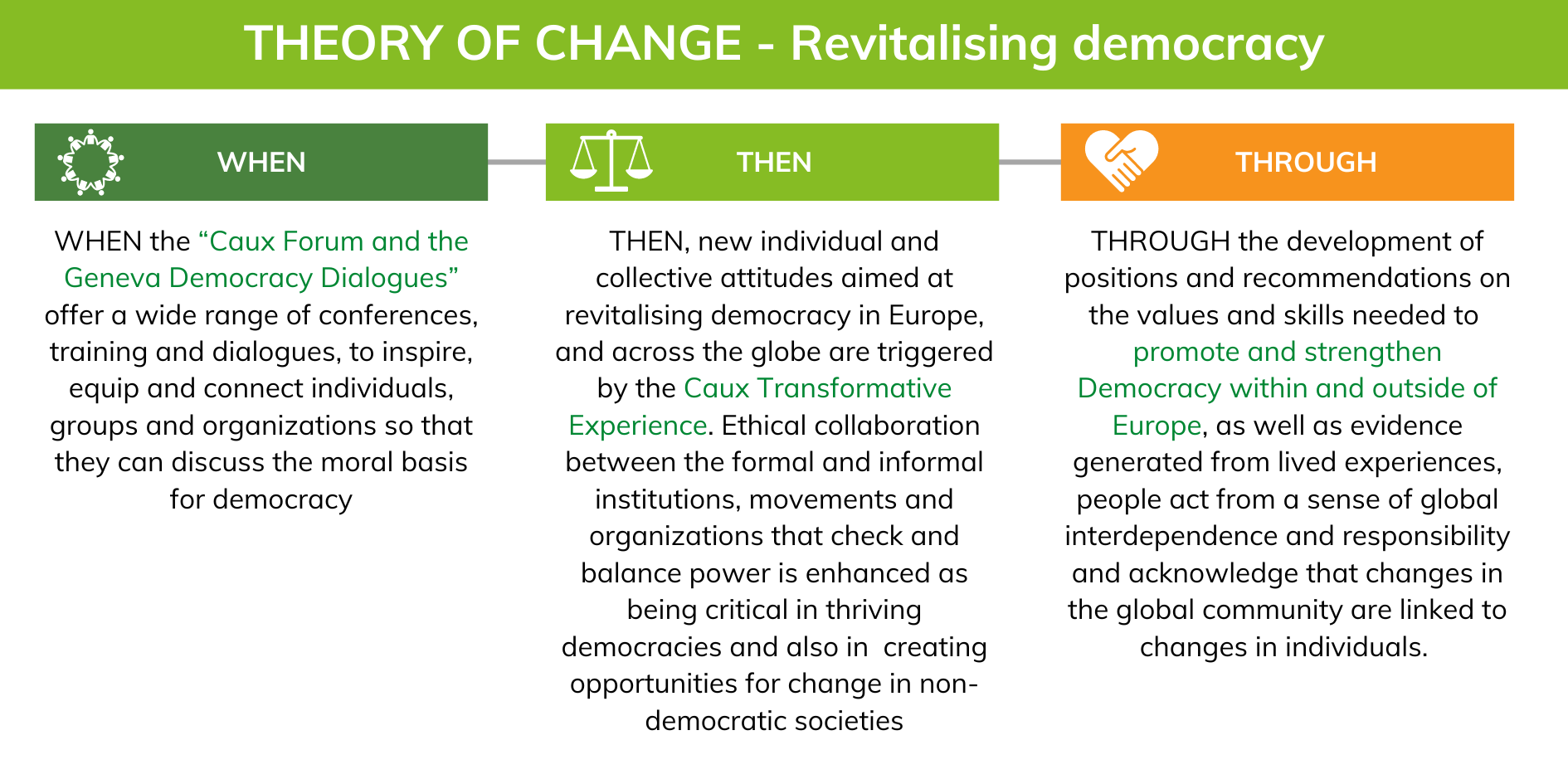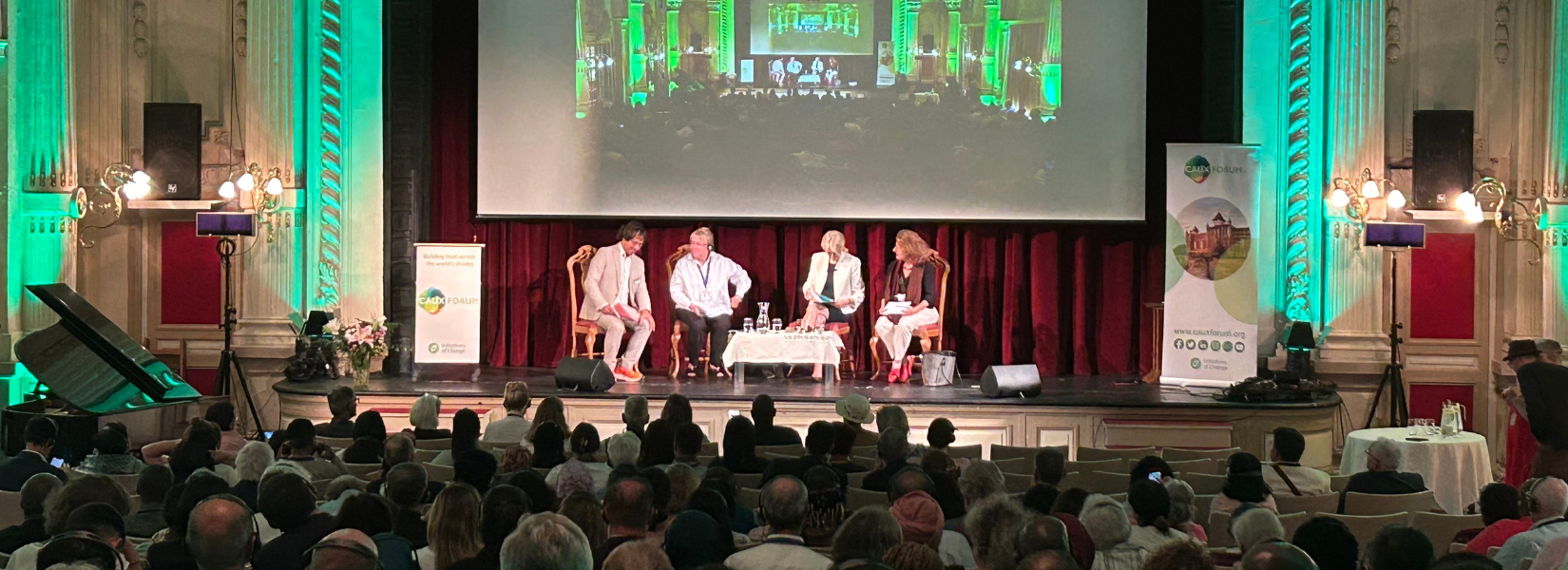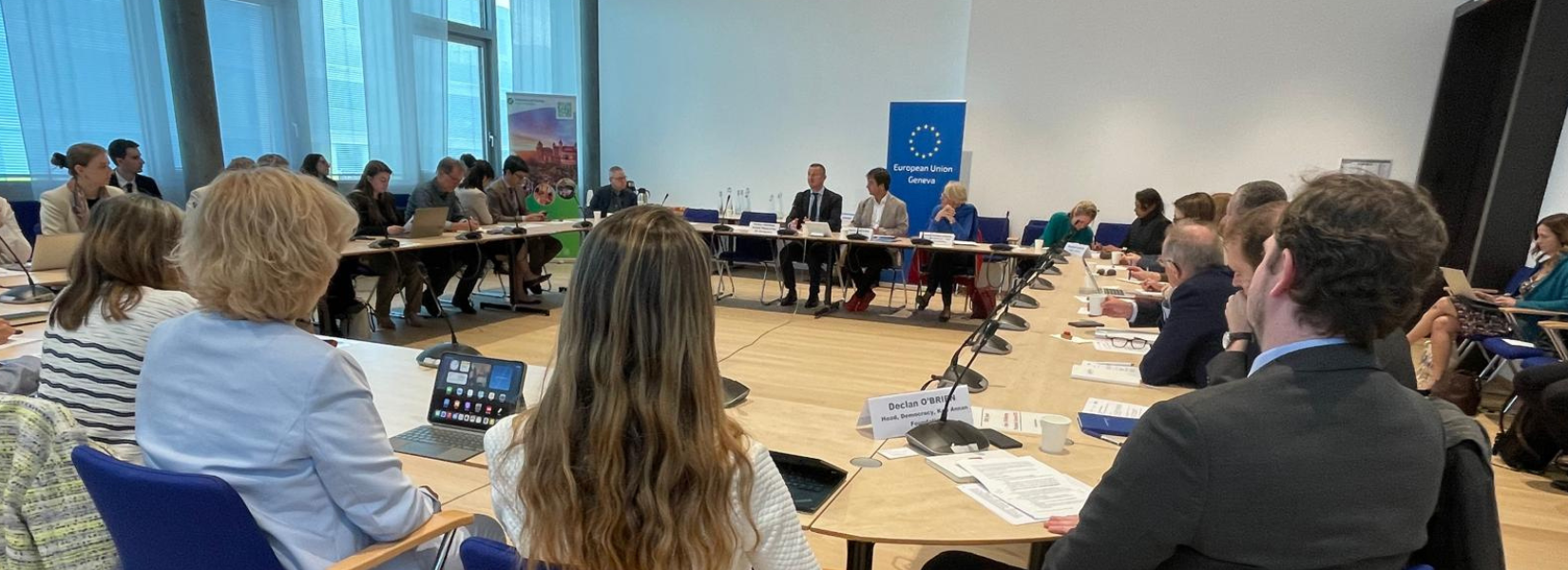Caux Democracy Programme 2024 - 2027
Caux Democracy Programme 2024 - 2027
How can democracy be revitalised across Europe and the wider world?
Introduction
In the words of Frank Buchman, who started Initiatives of Change (previously Moral Re-Armament) “Democracy’s inspired values are a life to be lived, a road to be followed”. Throughout the past 78 years, the approach of the Caux Initiatives of Change Foundation is that democracy depends on ordinary people and people in power who take responsibility and aim to live by high moral values.
International IDEA's Global State of Democracy Report 2023 makes clear that for democracy to thrive, a critical need is collaboration between the formal and informal institutions, movements and organisations that provide checks and balances to power. They also enable opportunities for change in non-democratic societies.
All stakeholders with an interest in reinforcing the legitimacy of the democratic model of governance have a role to play in creating, maintaining and supporting such collaboration, as well as being innovative in shaping such cooperation.
“We should remember that democracy thrives on participation and is threatened by apathy, fear and intolerance as much as by economic challenges. We must not take democracy for granted." (European Parliament president Martin Schulz in 2012).
The Initiatives of Change network has a long track record of focusing on the rights and responsibilities of individuals, protecting fundamental freedoms, and helping everyone discover their role in extending those freedoms across the world.
The Global State of Democracy
The IDEA Global State of Democracy 2023 report states: “The global state of democracy in 2023 is complex, fluid and unequal. Across every region of the world, democracy has continued to contract”. Data shows that countries with net declines in democratic performance again outnumbered those with net advances.
Europe leads in democratic performance, with countries like Switzerland showcasing strong institutional frameworks, but despite this, millions in Europe face economic hardships, climate change impacts, and political instability. The Russian aggression against Ukraine symbolises an attack on democracy, but Europe remains a desirable destination for immigrants from Africa and Asia due to its democratic values and rule of law. European nations, having learned cooperation from past conflicts, must now adopt foreign policies that promote peace, human rights, and sustainable development to maintain stability both within and beyond the continent.
Challenges to democracy are evident in other regions. Africa faces governance issues due to coups and conflicts, yet shows regional strengths in public participation. In Asia and the Pacific, the decline in democracy has halted but shows no improvement, while the Americas continue to see a decline in democratic principles. Western Asia experiences rising personalised authoritarianism. Despite these global challenges, there are signs of hope with reductions in corruption and increased political participation in some countries.
In short, democracy is in trouble. It is stagnant at best and declining in many places. But there are innovative approaches and signs of hope such as declines in corruption and increasing levels of political participation in several countries.
Countervailing institutions play an irreplaceable role in ensuring that democracy remains of and by the people. These include human rights organisations and electoral management bodies, civil society networks, popular movements and investigative journalists.
People’s engagement with countervailing institutions—which range from pacifist movements, civil society protests, to voting and engagement in community organisations—motivates progress, even if it is initially tenuous. This public participation, even in dangerous and unstable places, is the hope for the future of democracy.
The inner capacity to deal with complex environments and challenges
Individuals have a crucial role to play in establishing peace and cooperation internationally. What do we need to enable this change?
Addressing complex global challenges like climate change, the Covid pandemic, and the war in Ukraine requires more than just external strategies; it necessitates developing our inner capacities. The principles of democratic governance are integral to achieving Sustainable Development Goal 16, which envisions peaceful, just, and inclusive societies. However, a crucial yet often overlooked aspect is the cognitive and emotional skills needed for both personal and global change. Each individual holds the power and responsibility to self-reflect and align their actions with their values.
The Inner Development Goals (IDG) Initiative emphasises the importance of developing inner qualities such as trustworthiness, tolerance, and transparency to transform societal structures and revive good governance and integrity in public life. The Caux Palace, our centre for dialogue near Montreux, recognized as part of International Geneva, is evolving into a global hub for promoting these goals. In 2024, the Caux Initiatives of Change Foundation and the Inner Development Goals Foundation will host the Caux Inner Development Goals Forum to further this mission. This event aims to unlock individual potential and inspire participants to act as changemakers, reinforcing the idea that personal development is critical for achieving broader societal goals.
The Caux Democracy Programme 2024 - 2027
The Caux Democracy Programme is a comprehensive initiative designed to promote and enhance democratic governance, human rights, and sustainable economic development. It is part of our Caux Transformative Experience strategy 2022-2030 and our Global Engagement in International Geneva strategy 2024- 2030.
The general objective is to enable, facilitate and encourage the capabilities and attitudes needed to revitalise democracy in Europe and across the world.
The programme will be run over a period of four years, framed by 3 cycles of activities.
The programme will be delivered around four main sets of activities:
- Caux Fora for Democracy
- The Geneva Democracy Dialogues
- Diversity and Inclusion Events
- Communication and Partnerships
The Caux Democracy Forum
The Caux Democracy Forum, taking place in Caux, Switzerland from 8 to 12 July, 2025, aspires to inspire, equip, and connect individuals, groups, and organisations committed to strengthening democracy, human rights and civic engagement across Europe and the world.
This Forum comes at a critical juncture for global democracy. Building on the inaugural 2024 event and in the wake of the "super election year," we will delve deeper into the values essential for strengthening democracy in a rapidly evolving world, threatened by disinformation, polarisation and waning participation.
By bringing together voices from civil society, grassroots movements, governments, academia, corporations and non-traditional sectors, the Forum creates a unique platform for addressing pressing challenges and fostering citizen engagement.
The Caux Democracy Forum is part of a three-year programme launched in 2024 which includes the Geneva Democracy Dialogues held each May and October, regional events, and subsequent Caux Democracy Forums from 8-12 July, 2025 and 22-26 June, 2026.
This Forum is organised by Caux Initiatives of Change in partnership with Initiatives of Change International, The Swiss Federal Department of Foreign Affairs (FDFA) and OHCHR, as well as other partners (the list will continue to be updated in the weeks to come).
- Learn more about the 2024 edition
- Watch our Caux Democracy Forum 2025 replays
- Read the Caux Democracy Forum 2025 report
Geneva Democracy Dialogues
The Geneva Democracy Dialogues are designed to facilitate open, inclusive, and informed discussions on challenges for democracy, foster collaboration and innovation, and generate actionable recommendations. They are a part of the wider programme of Caux Initiatives of Change Foundation on Revitalising Democracy Across Europe and the Wider World.
The first edition of the Geneva Democracy Dialogue was organised on 23 May 2024 by Caux Initiatives of Change Foundation, with the support of the European Union Delegation, and in partnership with the Kofi Annan Foundation on the theme "How can Narratives help Revitalise Democracy in Europe?"
- Geneva Democracy Dialogue 23 May 2024 - Read the full report
- Geneva Democracy Dialogue 9 October 2024 - Read the full report
